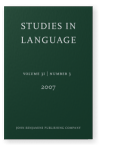Vol. 31:3 (2007) ► pp.525–568
It’s a split, but is it unaccusativity?
Two classes of intransitive verbs in Jalonke
Jalonke, a Mande language of Guinea, exhibits a formal split of intransitive verbs with respect to the possessive construction in which they appear. Whenever the single argument of a nominalized intransitive verb is linked to the possessor of the nominalized verb, an inalienable possessive construction is used with some verbs, and an alienable possessive construction with others. The inalienable possessive construction is also used for nominalized transitive verbs when possessed by their object participants, while the alienable possessive construction is used for transitive verbs possessed by their subject participants. Although synchronically not fully productive, this split points towards a diachronic explanation in terms of unaccusativity. It can be explained, however, without recurrence to different initial grammatical relations, but by relying on semantic differences only.
Cited by
Cited by 1 other publications
This list is based on CrossRef data as of 16 june 2024. Please note that it may not be complete. Sources presented here have been supplied by the respective publishers. Any errors therein should be reported to them.
